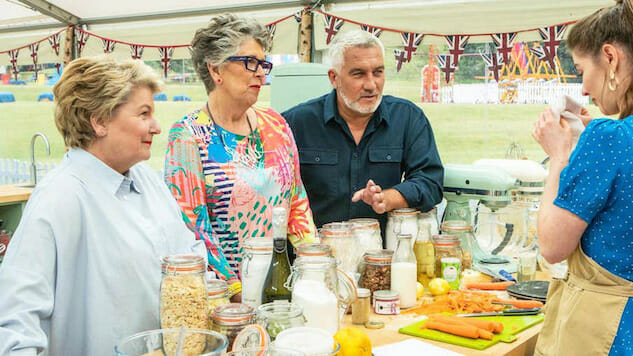The Great British Baking Show Had a Strong Finale Despite a Strange Season
Photo Courtesy of Netflix
When beloved TV gem The Great British Baking Show moved from the BBC to Channel 4 in its native U.K., it came with four big changes. One, it was moving to a more commercial atmosphere, which viewers thought might negatively influence it towards becoming more like the reality competition shows it was in such structural opposition to. Changes two, three, and four were the loss of its original hosts (Sue Perkins and Mel Giedroyc) and one original judge (Mary Berry), who were replaced by Noel Fielding, Sandi Toksvig, and Prue Leith respectively. Everything else ostensibly remained for Season 9: judge Paul Hollywood and his much sought-after handshakes, the always-too-hot tent propped up in a lush field outside a manor house, the plucky score and structure of the baking challenges and judging. Another change also came for U.S. viewers, which was that the show moved from PBS to Netflix, which was already home to a back catalogue of seasons. (For the purposes of this article, the season that just ended will be referred to as Season 10, rather than Netflix’s distinction as “Collection 7”).
For skeptical viewers, including yours truly, Season 9 won us over by keeping things as familiar as possible. Yes there were new faces, and it took a little while for Noel and Sandi to find their comedy groove, and initially quite a few of the bakers seemed markedly more attractive than past casts. But overall, things felt normal. Which, for The Great British Baking Show (or Bake Off / GBBO, as it’s known in the U.K.) means a quietly charming series where the casts form real friendships, encourage one another, and even help each other out. There’s no major cash prize, just a glass plate, but the exposure for many of these amateur bakers becomes very lucrative. Still, there’s a homey-ness to the proceedings—thanks in no small part to the gentleness of the judging, lack of catty comments, and a lack of interest in dramatic backstories—that has made the show a premiere Comfort TV watch of recent years (and propelled it into the top 10 of our Best TV Shows of the Decade).
With Season 10, though, things felt a little wobbly. It was the youngest cast yet, which doesn’t set off alarm bells on its own (many, though not all, of the most successful bakers on the series have been youngsters). Most of them were exceptionally camera-ready (there were no grandmothers in this group), but despite appearing to be decent bakers, many struggled with technical challenges and lamented working with classic baking styles. The usually genial Noel Fielding seemed to be actively getting on some of the bakers nerves with extended comedy bits, and the judges seemed particularly harsh on certain cast members who showed exactly the kind of imagination that they have praised in the past. There was also a gimmick where two bakers would be sent home at once, which was saved until far too late in the season. Favoritism seemed to dictate the outcomes of two episodes which should have been judged just on the performance that week and not cumulatively, leading to viewer outrage. And yet, the cast did seem to genuinely bond together over the course of the season. It was a mixed bag, which is not really what you want from GBBO; you come mainly for kindness and some fine baking.
Season 10, in other words, felt like the Season 9 we were all expecting. Something a little sleeker, a little cattier, a little more produced for dramatic effect. One of the other major changes this year for U.S. viewers was that we got to watch the show weekly, and only a few days after each new episode aired in the U.K. That was helpful in avoiding spoilers, but it also makes me wonder how much more pronounced some of the season’s problems might appear to a viewer choosing to binge it instead. And yet, the finale did seem to include the three best bakers of the bunch.